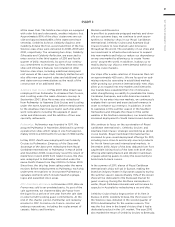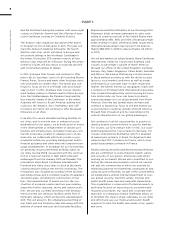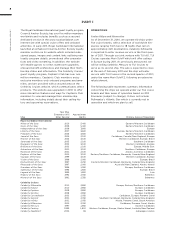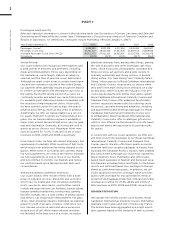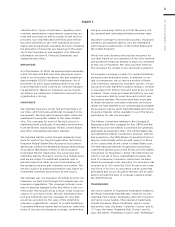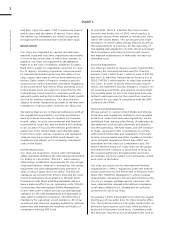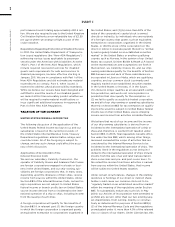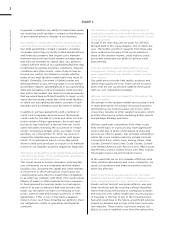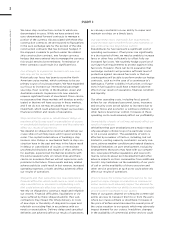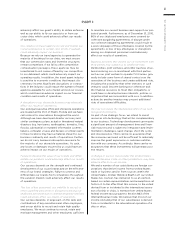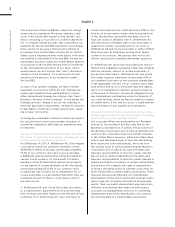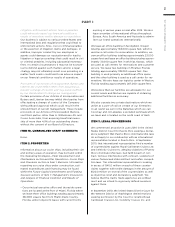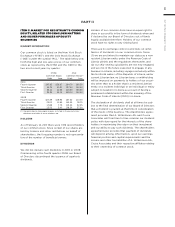Royal Caribbean Cruise Lines 2010 Annual Report Download - page 28
Download and view the complete annual report
Please find page 28 of the 2010 Royal Caribbean Cruise Lines annual report below. You can navigate through the pages in the report by either clicking on the pages listed below, or by using the keyword search tool below to find specific information within the annual report.
PART I
ROYAL CARIBBEAN CRUISES LTD. 25
amendment may not be enforceable with respect to
shares of common stock that were voted against the
amendment or that were recorded as abstaining from
the vote.
Also, it should be noted that Section 883 has been
the subject of legislative modifications in past years
that have had the effect of limiting its availability to
certain taxpayers, and there can be no assurance that
future legislation will not preclude us from obtaining
the benefits of Section 883.
Taxation in the Absence of an Exemption under
Section 883 of the Internal Revenue Code
If we, Celebrity Cruises Inc., or our ship-owning sub-
sidiaries were to fail to meet the requirements of
Section 883 of the Internal Revenue Code, or if the
provision was repealed, then, as explained below,
such companies would be subject to United States
income taxation on a portion of their income derived
from or incidental to the international operation of
our ships.
Because we and Celebrity Cruises Inc. conduct a trade
or business in the United States, we and Celebrity
Cruises Inc. would be taxable at regular corporate
rates on our separate company taxable income (i.e.,
without regard to the income of our ship-owning sub-
sidiaries), from United States sources, which includes
100% of income, if any, from transportation that begins
and ends in the United States (not including posses-
sions of the United States), 50% of income from trans-
portation that either begins or ends in the United
States, and no income from transportation that neither
begins nor ends in the United States. The legislative
history of the transportation income source rules sug-
gests that a cruise that begins and ends in a United
States port, but that calls on more than one foreign
port, will derive United States source income only from
the first and last legs of such cruise. This conclusion
is not free from doubt, however, because there are no
regulations or other Internal Revenue Service inter-
pretations of the above rules. In addition, if any of our
earnings and profits effectively connected with our
United States trade or business were withdrawn, or
were deemed to have been withdrawn, from our United
States trade or business, those withdrawn amounts
would be subject to a “branch profits” tax at the rate
of 30%. The amount of such earnings and profits would
be equal to the aforesaid United States source income,
with certain generally minor adjustments, less income
taxes. We and Celebrity Cruises Inc. would also be
potentially subject to tax on portions of certain inter-
est paid by us at rates of up to 30%.
If Section 883 were not available to our ship-owning
subsidiaries, each such subsidiary would be subject to
a special 4% tax on its United States source gross
transportation income, if any, each year because it
does not have a fixed place of business in the United
States and its income is derived from the leasing of a
ship. Such United States source gross transportation
income may be determined under any reasonable
method, including ratios of days traveling directly to
or from United States ports to total days traveling, or
of the lessee’s United States source gross income
from the ship (as determined under the source rules
discussed in the preceding paragraph, and subject to
the assumptions and qualifications set forth therein)
to the lessee’s total gross income from the ship.
MALTESE INCOME TAX
Our Pullmantur ship owner-operator subsidiaries qual-
ify as licensed shipping organizations in Malta. No
Maltese income tax is charged on the income derived
from shipping activities of a licensed shipping organi-
zation. Instead, a licensed shipping organization is
liable to pay a tonnage tax based on the net tonnage
of the ship or ships registered under the relevant
provisions of the Merchant Shipping Act. A company
qualifies as a shipping organization if it engages in
qualifying activities and it obtains a license from the
Registrar-General to enable it to carry on such activi-
ties. Qualifying activities include, but are not limited
to, the ownership, operation (under charter or other-
wise), administration and management of a ship or
ships registered as a Maltese ship in terms of the
Merchant Shipping Act and the carrying on of all
ancillary financial, security and commercial activities
in connection therewith.
Our Maltese operations that do not qualify as licensed
shipping organizations, which are not considered sig-
nificant, remain subject to normal Maltese corporate
income tax.
UNITED KINGDOM INCOME TAX
The Brilliance of the Seas is operated by a company
that is strategically and commercially managed in the
United Kingdom, which has elected to be subject to
the United Kingdom tonnage tax regime (“U.K. ton-
nage tax”). Commencing in 2011, to facilitate our
growth strategy, an additional eleven ships from our
fleet will be operated by a newly created company
that is strategically and commercially managed in the
United Kingdom and will also elect to be subject to
the U.K. tonnage tax regime.
Companies subject to U.K. tonnage tax pay a corpo-
rate tax on a notional profit determined with refer-
ence to the net tonnage of qualifying vessels. Normal
United Kingdom corporate income tax is not charge-
able on the relevant shipping profits of a qualifying
U.K. tonnage tax company. The requirements for a
company to qualify for the U.K. tonnage tax regime
include being subject to United Kingdom corporate


